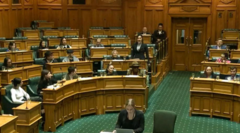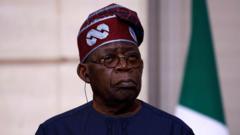**In a bold move against the political status quo, Senator Natasha Akpoti-Uduaghan has drawn attention to the challenges women face in Nigerian politics after alleging harassment from a top official.**
**Unyielding Spirit: Female Senator Challenges Power Dynamics in Nigeria**

**Unyielding Spirit: Female Senator Challenges Power Dynamics in Nigeria**
**Senator Natasha Akpoti-Uduaghan stands firm against purported political retaliation and highlights the struggle for women's rights in Nigeria.**
Senator Natasha Akpoti-Uduaghan has written a compelling account of her experiences in Nigeria's political landscape, where she recently accused one of the nation's highest-ranking politicians of sexual harassment. This accusation has sparked significant backlash, not against the accused, but against her. After making the allegations on national television, Akpoti-Uduaghan was suspended from her Senate position for six months without pay—a move she believes was retaliatory.
The senator claims her suspension was a clear illustration of the "classic abuse of power," highlighting a pervasive issue of sexism within Nigerian politics. "It’s discouraging, but it won’t deter me from my mission," Akpoti-Uduaghan stated from her home in Abuja. Voters in her constituency, fueled by anger and misinformation, have also begun efforts to have her removed from office, showcasing the severe implications of her decision to speak out.
Nigeria, while being the most populous country in Africa and possessing significant economic potential, has one of the lowest representations of women in parliamentary positions across the continent. The alarming statistics place the country among the bottom five rankings globally. As such, the events surrounding Akpoti-Uduaghan have ignited a national dialogue about gender equality and the necessity of elevating women's voices in governance.
As the political climate unfolds, Obiageli Ezekwesili—a former Nigerian education minister—described the situation as unprecedented, emphasizing the importance of supporting women who dare to confront abusive power dynamics. “This is a moment of change,” Ezekwesili noted, signifying that Akpoti-Uduaghan's actions could be pivotal in highlighting the systemic issues faced by women in Nigeria's political space.




















